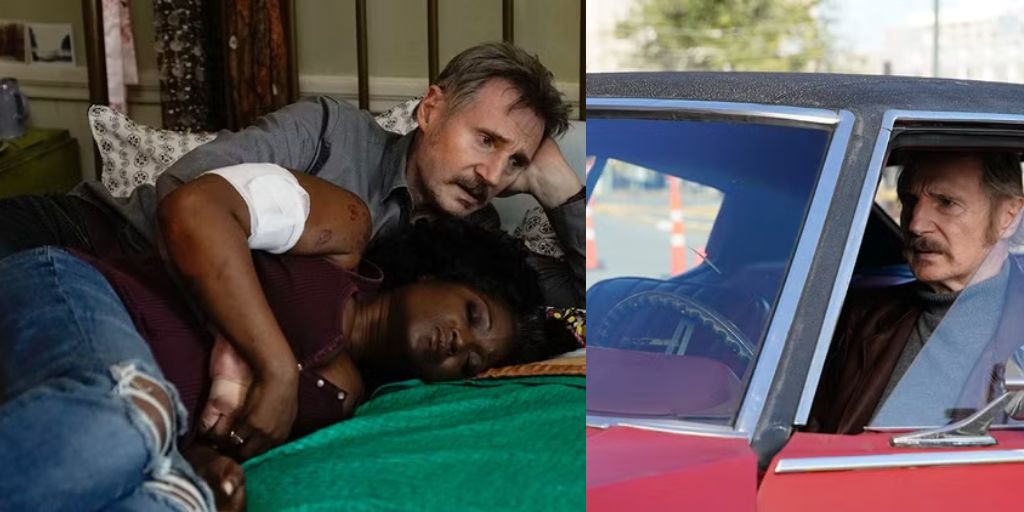Wake up, kiddo. It is time to watch another Liam Neeson action movie. Since starring in the big hit Taken, Liam Neeson has become the king of “old man action movies.” He has even made more movies than other action stars like Sylvester Stallone and Arnold Schwarzenegger in recent years. It is easy to see why. Neeson has shown many times that he can handle fight scenes. He is also a great actor who can show deep feelings even while fighting.
However, the collection of action movies starring Liam Neeson has had mixed results, especially in recent years. For every good movie like The Grey and Non-Stop, there are more average films like Memory and Retribution. Neeson’s latest action movie, Absolution, falls more into the average category. It is similar to many other crime thrillers and does not stand out even among Neeson’s own films.
Absolution Is Less of an Action Film and More of a Character Drama
Absolution is directed by Hans Petter Moland, who worked with Neeson before on Cold Pursuit in 2019. In Absolution, Neeson plays a tough enforcer who has been working for the same crime boss for thirty years. His life changes when he learns that he has an aggressive type of dementia.
Doctors say he only has a few years before his mind completely fails. This news forces our tough main character to think about his past choices and try to reconnect with his family.
Liam Neeson continues to show that he is a skilled action star with his strong presence and his willingness to do fight scenes. However, Absolution does not offer much for fans who crave nonstop action. Fortunately, the film is stronger in the drama department, which is what the film does best. Most of the movie focuses on Neeson’s character as he faces his own mortality and tries to make peace with his past mistakes.
Besides some silly dream sequences where Neeson’s character finds himself on a boat in the ocean, and some awkward editing, Absolution manages to create a compelling story about Neeson’s character who regrets his criminal life. This success is largely due to Neeson’s acting skills.
Liam Neeson Is as Consistent as Ever in Absolution
Absolution uses Liam Neeson’s talents very well, making his performance the best part of the movie. The tough and serious personality that fans love from films like Taken is present here too. Neeson convincingly plays a criminal who has lied and deceived many people.
Beneath his tough outer layer, he portrays a more vulnerable man. Some of the film’s best scenes show Neeson’s facial expressions and movements that reveal a frustrated man losing touch with reality. He does a solid job with the material he has. However, the script he is given often contains forgettable and generic lines.
The weak writing also affects the other characters in the film. Yolonda Ross plays the caring girlfriend, and Frankie Shaw plays the estranged daughter. Both characters seem to fit familiar roles we have seen many times in similar films. Although they are important to the story, they do not seem interesting or well-developed.
Their presence feels less significant because they lack depth. Furthermore, Absolution does not utilize the talents of Ron Perlman, who plays the crime boss. Perlman has shown before that he can portray a powerful mob boss in films like Drive, but here his role is almost like a cameo and adds nothing to the movie.
Absolution Cannot Escape the Shadow of Other Liam Neeson Films
Absolution tries so hard to be a typical Liam Neeson film that it forgets to give him anything new or exciting to do. The themes and concepts in Absolution are very similar to those in other films Neeson has starred in.
For instance, the main idea of an aging enforcer wanting to leave his violent lifestyle is very much like what we see in Run All Night and In the Land of Saints and Sinners. Both of those movies offer the action and excitement that Absolution lacks.
This is not even the first Liam Neeson film where he plays an action hero facing mental decline. Less than two years ago, he starred in Memory, where he also played a trained assassin who begins to forget important parts of his life. While Absolution seems more focused on character drama than pure action, it is hard not to compare it to Neeson’s other films.
In short, Absolution does not do enough to stand out from the similar films in Liam Neeson’s action resume. It frustratingly relies on themes from his past work, even though it is a story about confronting one’s history. While the film tries to show Neeson’s character as a real person rather than just a tough fighter, the clichéd screenplay makes it likely to become another forgettable entry in Neeson’s filmography.
A Deeper Look at the Film’s Themes
Now, let’s take a deeper look at the themes present in Absolution. The film is primarily about a man confronting his mortality and trying to find peace with his past. This theme is important as it makes the story relatable to many viewers.
Liam Neeson’s character struggles with his health condition. As he learns about his dementia, he realizes that he needs to change his ways. This reflects the universal human experience of facing one’s mortality. We all have to confront our choices and the consequences of our actions. This can be a powerful message for the audience. It reminds viewers that it is never too late to make amends and try to reconnect with loved ones.
In Absolution, Neeson’s character attempts to reach out to his family. He tries to mend his relationships, especially with his estranged daughter. This aspect of the film highlights the importance of family and the need for connection. It shows that even a hardened criminal can feel regret and desire to improve himself.
The Balance Between Action and Drama
One of the criticisms of Absolution is its imbalance between action and drama. While Liam Neeson is known for his action-packed roles, this film focuses more on his character’s internal struggle. It shifts away from the thrilling action sequences that many fans expect.

The film does include some action scenes, but they are not the primary focus. Instead, the film highlights Neeson’s character’s emotional journey. This is a bold choice, but it may not sit well with all audiences. Some fans may feel disappointed that the film does not deliver the intense action they are used to from Neeson’s previous films.
However, the choice to focus on character development can also be seen as a positive aspect. It shows that the filmmakers want to give Neeson more than just fight scenes. They aim to show the complexity of his character and the effects of his choices on his life. This approach can resonate with viewers looking for depth in storytelling.
Comparing Absolution to Other Liam Neeson Films
As previously mentioned, Absolution shares similarities with many of Liam Neeson’s other films. It is essential to compare these films to understand where Absolution fits in.
Films like Taken and The Grey are known for their thrilling action and engaging plots. Neeson’s characters in those films are often driven by a clear purpose, which keeps the audience engaged.
In Taken, he is a father determined to save his daughter. In The Grey, he is a man fighting for survival against nature. Both films provide a strong motivation for Neeson’s characters, leading to intense action scenes that attracts the audience.
In contrast, Absolution lacks that strong motivation. Neeson’s character is dealing with his health issues and trying to reconnect with his family. While these are important themes, they do not create the same level of excitement that action fans may expect. The film does have moments of tension, but they are not enough to keep viewers on the edge of their seats.
The Role of Supporting Characters
The supporting characters in Absolution play vital roles in the story. However, many of them feel like familiar stereotypes that do not bring much to the film.
For instance, Yolonda Ross’s character as the caring girlfriend is predictable. Similarly, Frankie Shaw’s role as the estranged daughter does not offer anything new. These characters could have been more developed to provide a richer experience for the audience.
Ron Perlman, who plays the crime boss, also has a limited role. His character is underused, and this is disappointing considering Perlman’s talent. He could have brought a more menacing presence to the film, but instead, he feels more like a background character. This lack of strong supporting roles contributes to the film’s failure to engage viewers fully.
Cinematic Techniques and Direction
In addition to character development and themes, the direction and cinematography of Absolution play a significant role in how the story is told. Directed by Hans Petter Moland, the film has a distinct visual style that sets it apart from other action films. However, the direction does not fully capitalize on Neeson’s strengths as an action star.
The pacing of the film can be uneven at times. Some scenes feel drawn out, which can cause viewers to lose interest. While moments of introspection are essential for character development, they must be balanced with engaging storytelling.
The editing can also feel choppy, which detracts from the film’s full flow and impact. These issues can lead to a frustrating viewing experience, as audiences may find themselves waiting for the action to pick up.
On the positive side, there are moments of visual storytelling that effectively convey the character’s emotional state. For instance, the use of lighting and camera angles often reflects Neeson’s character’s internal struggles.
In scenes where he is grappling with his diagnosis, dim lighting and close-up shots emphasize his vulnerability. These artistic choices add depth to the film, showcasing the director’s intention to focus on the character’s emotional journey.
Audience Reception and Critical Response
Upon its release, Absolution garnered a mixed response from critics and audiences alike. Some praised Neeson’s performance as a highlight of the film, appreciating his ability to bring depth to a troubled character. Critics noted that Neeson’s charisma still shines through, even when the material is lacking.
However, many viewers expressed disappointment in the lack of thrilling action sequences. This division in reception highlights the challenges the film faces in appealing to Neeson’s fan base.
The film has been described as being more suited for viewers looking for character-driven narratives rather than those seeking explosive action. This distinction may affect its box office performance, as action films generally perform better when they deliver high-octane thrills.
While Absolution attempts to carve out a niche in the action genre by prioritizing drama, it risks alienating viewers who come expecting the adrenaline-fueled excitement typical of Neeson’s previous works.
The Future of Liam Neeson in Action Films
As Liam Neeson continues to age, his future in action films raises questions about the direction his career will take. Will he remain the leading man in action movies, or will he shift toward more dramatic roles? Absolution hints at the potential for Neeson to take on more character-driven narratives that show deeper emotional themes. However, the question remains whether this is what audiences want to see from him.
Neeson has mentioned in interviews that he enjoys the challenges of playing complex characters. As he sees the view of his career, it is essential for him to choose roles that align with his interests while also appealing to his fan base. Films that blend action with character development may be the way forward, allowing him to maintain his status as an action star while also going into more profound themes.
Conclusion: A Mixed Bag of Drama and Action
Absolution is a film that strives to be more than just another entry in Liam Neeson’s action filmography. It attempts to balance character drama with action, focusing on themes of mortality, redemption, and the consequences of past actions.

While Neeson’s performance remains a standout aspect, the film’s reliance on familiar tropes and clichéd dialogue holds it back.
The film’s uneven pacing, underdeveloped supporting characters, and lack of engaging action sequences contribute to its mixed reception. Ultimately, Absolution may find its place as a character study rather than an action film, which could appeal to a niche audience but may leave traditional action fans disappointed.
As Neeson continues to see his career, it will be interesting to see how he balances the expectations of his audience with his desire to take on challenging and meaningful roles.





